外研版(2019)选择性必修 第一册Unit 2 Onwards and upwards Using language课件(共28张PPT)
文档属性
| 名称 | 外研版(2019)选择性必修 第一册Unit 2 Onwards and upwards Using language课件(共28张PPT) |  | |
| 格式 | pptx | ||
| 文件大小 | 787.3KB | ||
| 资源类型 | 教案 | ||
| 版本资源 | 外研版(2019) | ||
| 科目 | 英语 | ||
| 更新时间 | 2023-10-26 16:09:07 | ||
图片预览

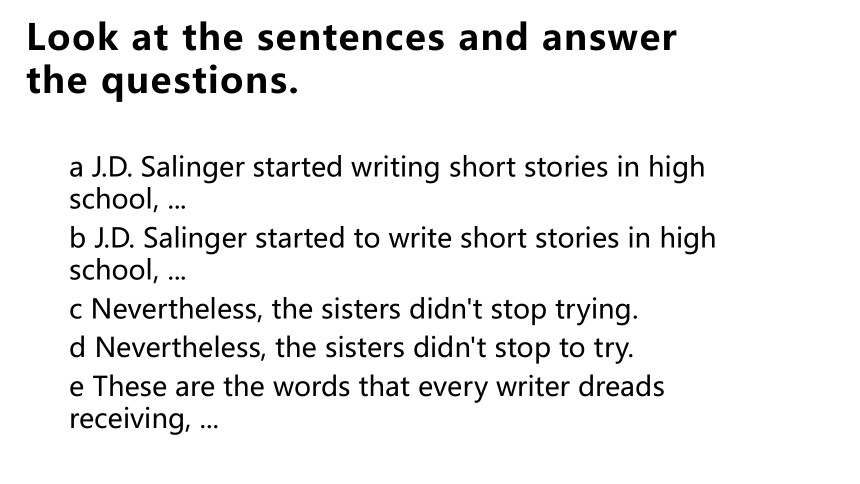
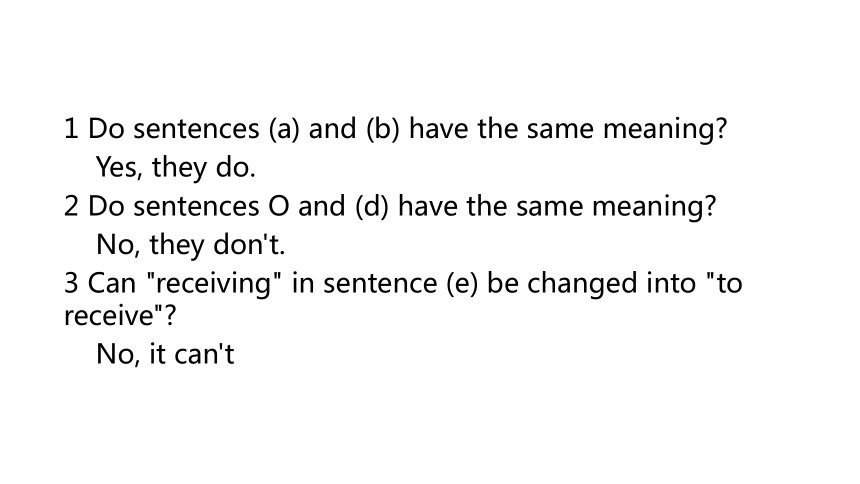
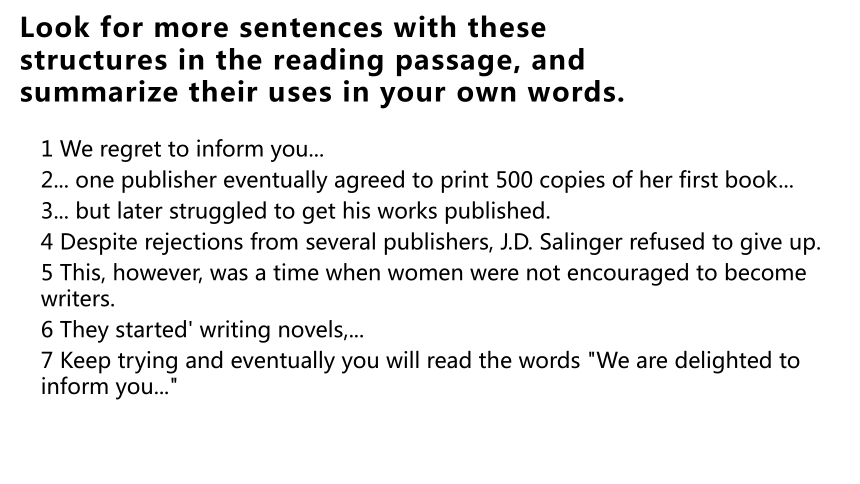
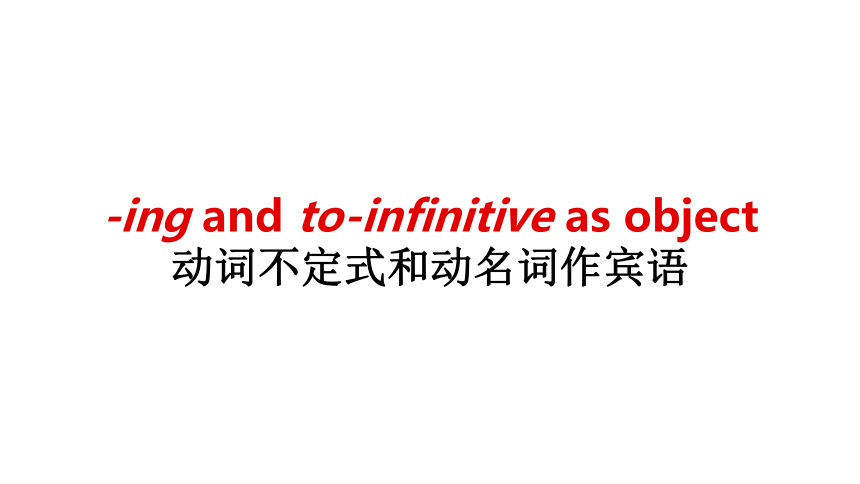
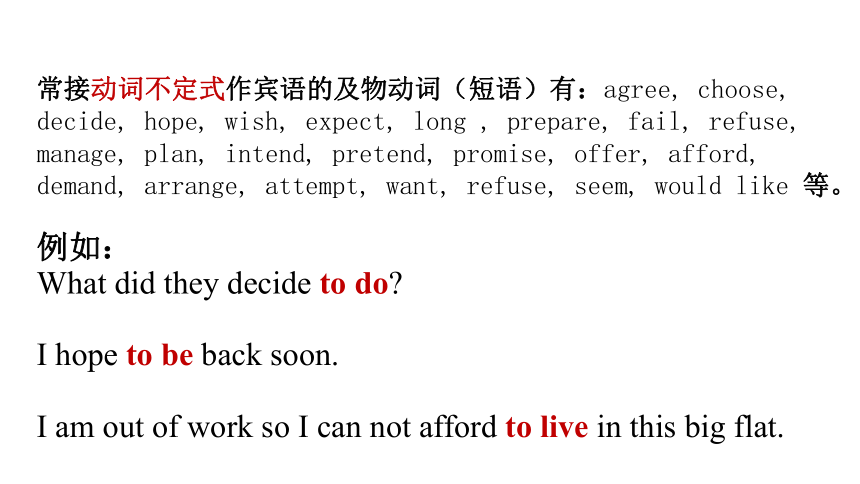
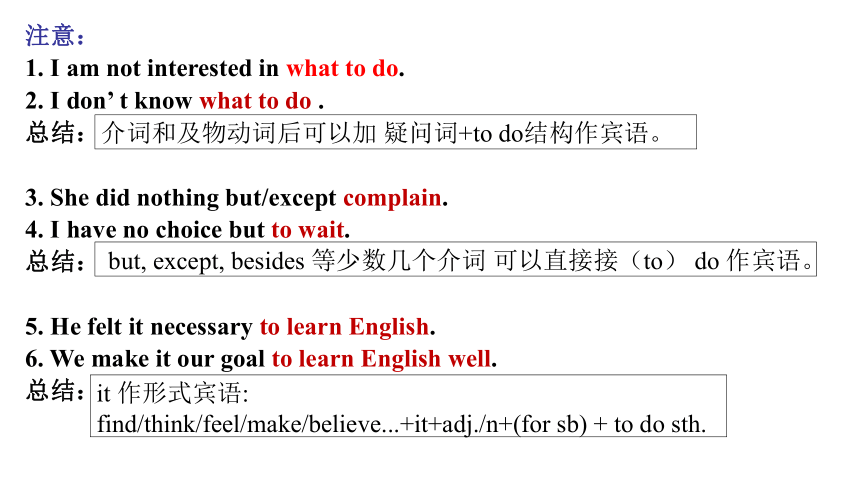
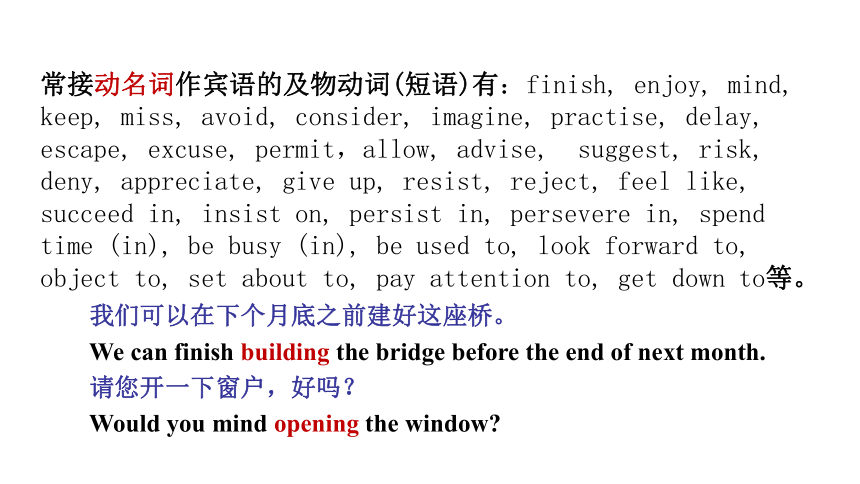
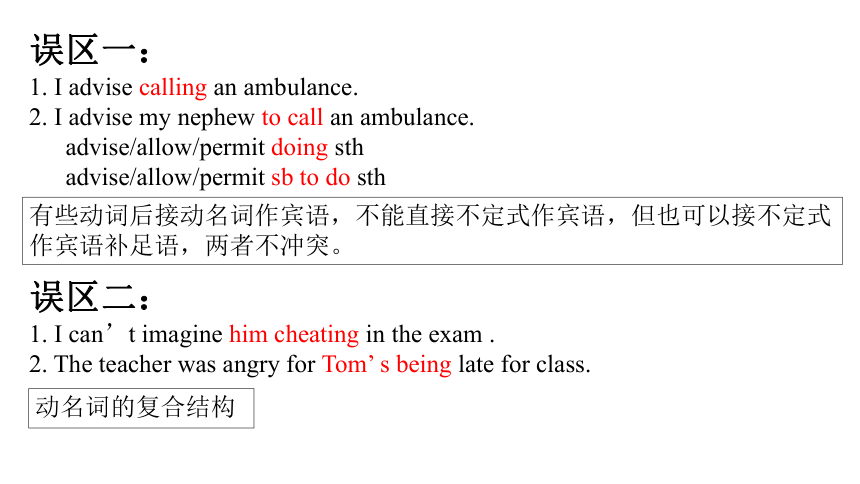
文档简介
(共28张PPT)
Unit 2 Onwards and upwards
Using Language
Look at the sentences and answer the questions.
a J.D. Salinger started writing short stories in high school, ...
b J.D. Salinger started to write short stories in high school, ...
c Nevertheless, the sisters didn't stop trying.
d Nevertheless, the sisters didn't stop to try.
e These are the words that every writer dreads receiving, ...
1 Do sentences (a) and (b) have the same meaning
Yes, they do.
2 Do sentences O and (d) have the same meaning
No, they don't.
3 Can "receiving" in sentence (e) be changed into "to receive"
No, it can't
Look for more sentences with these structures in the reading passage, and summarize their uses in your own words.
1 We regret to inform you...
2... one publisher eventually agreed to print 500 copies of her first book...
3... but later struggled to get his works published.
4 Despite rejections from several publishers, J.D. Salinger refused to give up.
5 This, however, was a time when women were not encouraged to become writers.
6 They started' writing novels,...
7 Keep trying and eventually you will read the words "We are delighted to inform you..."
-ing and to-infinitive as object
动词不定式和动名词作宾语
常接动词不定式作宾语的及物动词(短语)有:agree, choose, decide, hope, wish, expect, long , prepare, fail, refuse, manage, plan, intend, pretend, promise, offer, afford, demand, arrange, attempt, want, refuse, seem, would like 等。
例如:
What did they decide to do
I hope to be back soon.
I am out of work so I can not afford to live in this big flat.
注意:
1. I am not interested in what to do.
2. I don’ t know what to do .
总结:
3. She did nothing but/except complain.
4. I have no choice but to wait.
总结:
5. He felt it necessary to learn English.
6. We make it our goal to learn English well.
总结:
介词和及物动词后可以加 疑问词+to do结构作宾语。
but, except, besides 等少数几个介词 可以直接接(to) do 作宾语。
it 作形式宾语:
find/think/feel/make/believe...+it+adj./n+(for sb) + to do sth.
常接动名词作宾语的及物动词(短语)有:finish, enjoy, mind, keep, miss, avoid, consider, imagine, practise, delay, escape, excuse, permit,allow, advise, suggest, risk, deny, appreciate, give up, resist, reject, feel like, succeed in, insist on, persist in, persevere in, spend time (in), be busy (in), be used to, look forward to, object to, set about to, pay attention to, get down to等。
我们可以在下个月底之前建好这座桥。
We can finish building the bridge before the end of next month.
请您开一下窗户,好吗?
Would you mind opening the window
误区一:
1. I advise calling an ambulance.
2. I advise my nephew to call an ambulance.
advise/allow/permit doing sth
advise/allow/permit sb to do sth
有些动词后接动名词作宾语,不能直接不定式作宾语,但也可以接不定式作宾语补足语,两者不冲突。
误区二:
1. I can’t imagine him cheating in the exam .
2. The teacher was angry for Tom’ s being late for class.
动名词的复合结构
两者均可接的及物动词
有些及物动词后既可接动名词作宾语,又可接动词不定式作宾语,且两者意义差别不大。这类词有:
prefer, like ,love, hate, begin, start, continue, 等。
离开教室后,学生们开始做作业。
After the teacher left the classroom, the students began to do/ doing their homework.
但在下列情况下,宜用动词不定式作宾语,而不用动名词。
like, love, prefer, hate等与would或should连用时:
I’d prefer to stay at home to watch TV.
begin, start等本身用进行时时。如:
She was starting to do her homework.
begin, start的主语是物而不是人时。如:
The ice begins to melt in winter.
有些及物动词后既可接动名词作宾语,又可接动词不定式作宾语,但两者结构意义不同。
① 像remember, forget, regret这类词;
remember, forget, regret + to do
remember, forget, regret +doing
表示该动作还未发生
表示该动作已经发生
② 有些及物动词(短语)后跟动词不定式或动名词时,结构不同,则意思差别很大。
mean to do sth. 打算(意图)做某事
mean doing sth. 意味着做某事
can't help to do sth. 不能帮忙做某事
can't help doing sth. 情不自禁做某事
go on to do sth. 接着做另一件事
go on doing sth. 继续做同一件事
stop to do sth 停下来去做另一件事
stop doing sth 停下来正在做的事
try to do sth 努力做某事
try doing sth 尝试做某事
注意:
need, want, require,deserve等动词后面跟动名词的主动形式和动词不定式的被动式都表示被动意义。如:
Your house needs repairing.
= Your house needs to be repaired.
The scientist deserves respecting.
=The scientist deserves to be respected.
need/want/require/deserve doing= need/want/require to be done
Grammar
Focus
-ing and to
-infinitive
as object
动词+-ing
动词+ to-infinitive
语义无区别
语义有区别
动词 + -ing(只能接-ing作宾语)
动词 + to-infinitive(只能接 to-infinitive作宾语)
动词后接非谓语动词作宾语的情况分为三种:
只能接-ing;
只能接to-infinitive;
接-ing或to-infinitive皆可。
Focus on
重点关注
-ing and to-infinitive
as object
1. He suggested ______(do) it in a different way.
2. The president tried to escape _________ (answer) the reporter’s questions.
3. I admit ________ (read) your letter.
4. I avoid ___________(mention) the subject in case he should be offended.
5. It is hard to imagine ______ (live) on the moon, where there is neither air nor water.
Fill in the blanks using the correct form of the words.
doing
answering
reading
mentioning
living
这些动词之后只能接-ing作宾语
只能接-ing(作宾语)的动词和短语
承认(admit)冒险(risk)别继续(keep),
理解(understand)原谅(excuse)和感激(appreciate);
推迟(delay)享受(enjoy)真可惜,
完成(finish)想象(imagine) 又建议(suggest, advise);
避免(avoid, escape)介意(mind)别延期(put off),
错过(miss)宽恕(forgive)不考虑(consider);
允许(allow, permit)抵制(resist, stand)或放弃
(give up),
坚持(insist on)练习(practice)要牢记。
后接 -ing 的短语
feel like dream of object to put off be worth be busy
look forward to get used to be used to be accustomed to get down to
1. He refused ________ (speak) on the radio.
2. Jill failed ________(make) a good impression at the job interview.
3. Sarah, wants ________ (prove) that she has brains as well as beauty.
4. The robber attempted ______ (rob) the valuable goods being transported.
Fill in the blanks using the correct form of the words.
to speak
to make
to prove
to rob
这些动词之后只能接to-infinitive作宾语
只能接to-infinitive(作宾语)的动词
四个希望三答应(hope, wish, expect, long; agree,
promise, undertake)
五个想要巧安排(intend, plan, want, mean, desire; arrange)
设法学会做决定(manage, learn, decide, determine)
企图假装要选择(attempt, pretend, choose)
提供要求别拒绝(offer, demand, refuse)
威胁准备不失败(threaten, prepare, fail)
某些动词后既可以使用-ing又可以使用to-infinitive,在语义上几乎没有区别。
continue prefer begin hate
like start love
I like getting up early.
= I like to get up early
某些动词后既可以使用-ing又可以使用to-infinitive,但语义有区别。
forget regret remember
mean try stop …
I. Complete these sentences with the correct form of the verbs in brackets.
1. I can’t afford _______(buy ) a new car .
2. I decided ________(go).
3. Would you mind _______(tell) me the
way to the post office
4. Xiao Lin managed _________(finish) the
work in time.
5. Have you considered _______(get) a job
abroad
to buy
to go
telling
to finish
getting
6. The police offered _________(help) us.
7. Have you finished _______(do) your
homework
8. You must practice ___________(listen)
and ___________(speak) English more.
9. The children wanted_______(go) with us.
10. You’d better avoid _________(read) in
the bus.
to help
doing
listening
speaking
to go
reading
11. On each card, write down one thing you
should do, want______, hope _____, plan
_____, or dream of _________(do).
12. The book doesn't pretend_________(be)
a great work of literature.
13. Looking forward to __________(hear)
from you soon.
14. Because he is not at home, he can’t help ________ (wash) the clothes.
15. Mary couldn't help _________ (laugh)
when she heard the joke.
laughing
doing
to be
hearing
to do
to do
to do
to wash
1.你能想象单独生活在一个岛上么?
2.我建议结束会议。
3.他承认钱是他拿的。
II. Translate the following sentences into English.
Can you imagine living alone on an island
I suggest bringing the meeting to an end.
He admitted taking the money.
4.她坚持要学医。
5.你是否考虑过找一位笔友?
6.我们同意在此见面,到现在她也没露面。
She insisted on studying medicine.
We agreed to meet here but so far she
hasn’t turned up yet.
Have you considered looking for a pen pal
Unit 2 Onwards and upwards
Using Language
Look at the sentences and answer the questions.
a J.D. Salinger started writing short stories in high school, ...
b J.D. Salinger started to write short stories in high school, ...
c Nevertheless, the sisters didn't stop trying.
d Nevertheless, the sisters didn't stop to try.
e These are the words that every writer dreads receiving, ...
1 Do sentences (a) and (b) have the same meaning
Yes, they do.
2 Do sentences O and (d) have the same meaning
No, they don't.
3 Can "receiving" in sentence (e) be changed into "to receive"
No, it can't
Look for more sentences with these structures in the reading passage, and summarize their uses in your own words.
1 We regret to inform you...
2... one publisher eventually agreed to print 500 copies of her first book...
3... but later struggled to get his works published.
4 Despite rejections from several publishers, J.D. Salinger refused to give up.
5 This, however, was a time when women were not encouraged to become writers.
6 They started' writing novels,...
7 Keep trying and eventually you will read the words "We are delighted to inform you..."
-ing and to-infinitive as object
动词不定式和动名词作宾语
常接动词不定式作宾语的及物动词(短语)有:agree, choose, decide, hope, wish, expect, long , prepare, fail, refuse, manage, plan, intend, pretend, promise, offer, afford, demand, arrange, attempt, want, refuse, seem, would like 等。
例如:
What did they decide to do
I hope to be back soon.
I am out of work so I can not afford to live in this big flat.
注意:
1. I am not interested in what to do.
2. I don’ t know what to do .
总结:
3. She did nothing but/except complain.
4. I have no choice but to wait.
总结:
5. He felt it necessary to learn English.
6. We make it our goal to learn English well.
总结:
介词和及物动词后可以加 疑问词+to do结构作宾语。
but, except, besides 等少数几个介词 可以直接接(to) do 作宾语。
it 作形式宾语:
find/think/feel/make/believe...+it+adj./n+(for sb) + to do sth.
常接动名词作宾语的及物动词(短语)有:finish, enjoy, mind, keep, miss, avoid, consider, imagine, practise, delay, escape, excuse, permit,allow, advise, suggest, risk, deny, appreciate, give up, resist, reject, feel like, succeed in, insist on, persist in, persevere in, spend time (in), be busy (in), be used to, look forward to, object to, set about to, pay attention to, get down to等。
我们可以在下个月底之前建好这座桥。
We can finish building the bridge before the end of next month.
请您开一下窗户,好吗?
Would you mind opening the window
误区一:
1. I advise calling an ambulance.
2. I advise my nephew to call an ambulance.
advise/allow/permit doing sth
advise/allow/permit sb to do sth
有些动词后接动名词作宾语,不能直接不定式作宾语,但也可以接不定式作宾语补足语,两者不冲突。
误区二:
1. I can’t imagine him cheating in the exam .
2. The teacher was angry for Tom’ s being late for class.
动名词的复合结构
两者均可接的及物动词
有些及物动词后既可接动名词作宾语,又可接动词不定式作宾语,且两者意义差别不大。这类词有:
prefer, like ,love, hate, begin, start, continue, 等。
离开教室后,学生们开始做作业。
After the teacher left the classroom, the students began to do/ doing their homework.
但在下列情况下,宜用动词不定式作宾语,而不用动名词。
like, love, prefer, hate等与would或should连用时:
I’d prefer to stay at home to watch TV.
begin, start等本身用进行时时。如:
She was starting to do her homework.
begin, start的主语是物而不是人时。如:
The ice begins to melt in winter.
有些及物动词后既可接动名词作宾语,又可接动词不定式作宾语,但两者结构意义不同。
① 像remember, forget, regret这类词;
remember, forget, regret + to do
remember, forget, regret +doing
表示该动作还未发生
表示该动作已经发生
② 有些及物动词(短语)后跟动词不定式或动名词时,结构不同,则意思差别很大。
mean to do sth. 打算(意图)做某事
mean doing sth. 意味着做某事
can't help to do sth. 不能帮忙做某事
can't help doing sth. 情不自禁做某事
go on to do sth. 接着做另一件事
go on doing sth. 继续做同一件事
stop to do sth 停下来去做另一件事
stop doing sth 停下来正在做的事
try to do sth 努力做某事
try doing sth 尝试做某事
注意:
need, want, require,deserve等动词后面跟动名词的主动形式和动词不定式的被动式都表示被动意义。如:
Your house needs repairing.
= Your house needs to be repaired.
The scientist deserves respecting.
=The scientist deserves to be respected.
need/want/require/deserve doing= need/want/require to be done
Grammar
Focus
-ing and to
-infinitive
as object
动词+-ing
动词+ to-infinitive
语义无区别
语义有区别
动词 + -ing(只能接-ing作宾语)
动词 + to-infinitive(只能接 to-infinitive作宾语)
动词后接非谓语动词作宾语的情况分为三种:
只能接-ing;
只能接to-infinitive;
接-ing或to-infinitive皆可。
Focus on
重点关注
-ing and to-infinitive
as object
1. He suggested ______(do) it in a different way.
2. The president tried to escape _________ (answer) the reporter’s questions.
3. I admit ________ (read) your letter.
4. I avoid ___________(mention) the subject in case he should be offended.
5. It is hard to imagine ______ (live) on the moon, where there is neither air nor water.
Fill in the blanks using the correct form of the words.
doing
answering
reading
mentioning
living
这些动词之后只能接-ing作宾语
只能接-ing(作宾语)的动词和短语
承认(admit)冒险(risk)别继续(keep),
理解(understand)原谅(excuse)和感激(appreciate);
推迟(delay)享受(enjoy)真可惜,
完成(finish)想象(imagine) 又建议(suggest, advise);
避免(avoid, escape)介意(mind)别延期(put off),
错过(miss)宽恕(forgive)不考虑(consider);
允许(allow, permit)抵制(resist, stand)或放弃
(give up),
坚持(insist on)练习(practice)要牢记。
后接 -ing 的短语
feel like dream of object to put off be worth be busy
look forward to get used to be used to be accustomed to get down to
1. He refused ________ (speak) on the radio.
2. Jill failed ________(make) a good impression at the job interview.
3. Sarah, wants ________ (prove) that she has brains as well as beauty.
4. The robber attempted ______ (rob) the valuable goods being transported.
Fill in the blanks using the correct form of the words.
to speak
to make
to prove
to rob
这些动词之后只能接to-infinitive作宾语
只能接to-infinitive(作宾语)的动词
四个希望三答应(hope, wish, expect, long; agree,
promise, undertake)
五个想要巧安排(intend, plan, want, mean, desire; arrange)
设法学会做决定(manage, learn, decide, determine)
企图假装要选择(attempt, pretend, choose)
提供要求别拒绝(offer, demand, refuse)
威胁准备不失败(threaten, prepare, fail)
某些动词后既可以使用-ing又可以使用to-infinitive,在语义上几乎没有区别。
continue prefer begin hate
like start love
I like getting up early.
= I like to get up early
某些动词后既可以使用-ing又可以使用to-infinitive,但语义有区别。
forget regret remember
mean try stop …
I. Complete these sentences with the correct form of the verbs in brackets.
1. I can’t afford _______(buy ) a new car .
2. I decided ________(go).
3. Would you mind _______(tell) me the
way to the post office
4. Xiao Lin managed _________(finish) the
work in time.
5. Have you considered _______(get) a job
abroad
to buy
to go
telling
to finish
getting
6. The police offered _________(help) us.
7. Have you finished _______(do) your
homework
8. You must practice ___________(listen)
and ___________(speak) English more.
9. The children wanted_______(go) with us.
10. You’d better avoid _________(read) in
the bus.
to help
doing
listening
speaking
to go
reading
11. On each card, write down one thing you
should do, want______, hope _____, plan
_____, or dream of _________(do).
12. The book doesn't pretend_________(be)
a great work of literature.
13. Looking forward to __________(hear)
from you soon.
14. Because he is not at home, he can’t help ________ (wash) the clothes.
15. Mary couldn't help _________ (laugh)
when she heard the joke.
laughing
doing
to be
hearing
to do
to do
to do
to wash
1.你能想象单独生活在一个岛上么?
2.我建议结束会议。
3.他承认钱是他拿的。
II. Translate the following sentences into English.
Can you imagine living alone on an island
I suggest bringing the meeting to an end.
He admitted taking the money.
4.她坚持要学医。
5.你是否考虑过找一位笔友?
6.我们同意在此见面,到现在她也没露面。
She insisted on studying medicine.
We agreed to meet here but so far she
hasn’t turned up yet.
Have you considered looking for a pen pal
